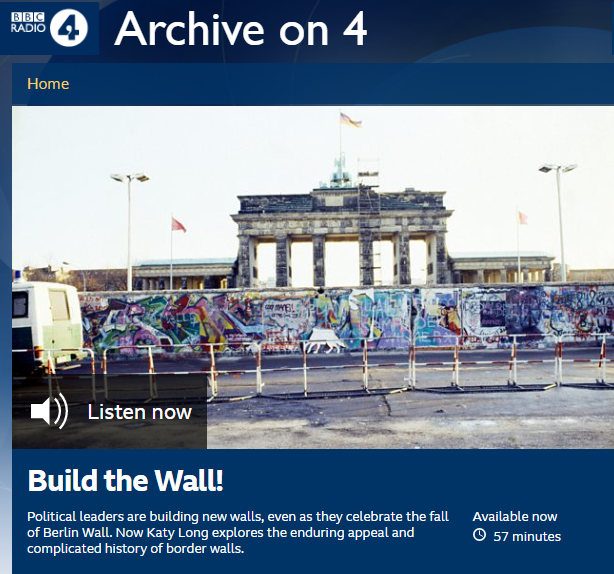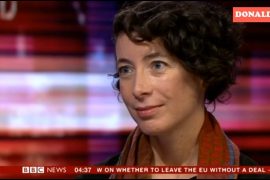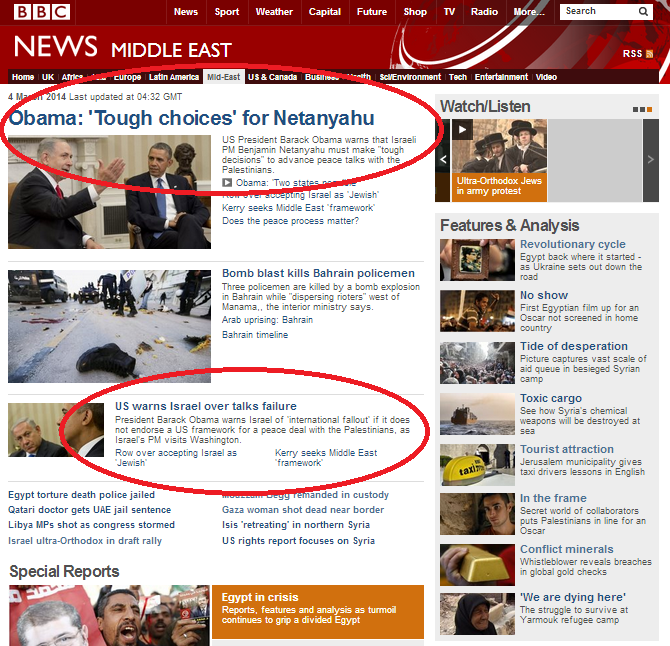Visitors to the BBC News website’s Middle East page on the morning of January 27th found two reports – one written and one filmed – ostensibly about the Israeli prime minister’s response to remarks made by the UN Secretary General the previous day.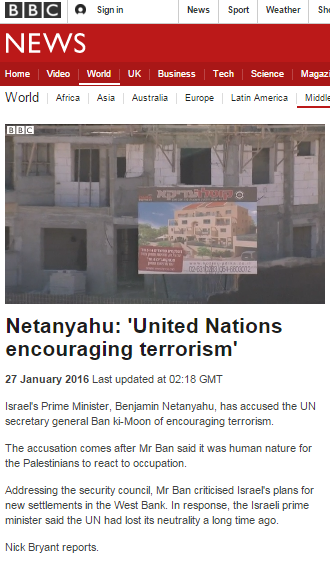
The filmed report (made for BBC television news programmes) appears under the title “Netanyahu: ‘United Nations encouraging terrorism’” and it opens with the BBC’s Nick Bryant telling viewers that:
“It’s Israel’s settlement building that’s particularly angered the UN Secretary General and the government’s latest decision to approve plans for over 150 new homes in the West Bank: moves that most of the international community regards as illegal or illegitimate.”
Viewers would therefore quite reasonably conclude that there has been an official announcement from the Israeli authorities concerning “plans for over 150 new homes” but that is not in fact the case.
The source of this story is the political NGO ‘Peace Now’ and an article which appeared in the Israeli newspaper Ha’aretz on January 25th. As the Times of Israel points out:
“There was no official confirmation of the new approvals.”
Nick Bryant nevertheless chose to make that absence of official confirmation disappear from his portrayal of the story.
Bryant goes on to tell viewers:
“Addressing the UN Security Council, Ban Ki Moon demanded a freeze in settlement activity.”
He does not clarify that, according to both the sources of his story, an informal construction freeze has been in place for “almost two years”. The Ha’aretz report opens with the following words:
“Israeli planning authorities approved the construction of 153 new apartments in West Bank settlements last week, effectively putting an end to an informal construction freeze that has lasted about 18 months.
For almost two years now, the government has largely refused to advance new building plans in the territories…”
Bryant’s failure to disclose both that point and the lack of official confirmation for his story is all the more egregious given that via the written report – titled “Netanyahu says UN chief Ban Ki-moon ‘encouraging terror’” – we can deduce that the BBC is in fact well aware of both factors.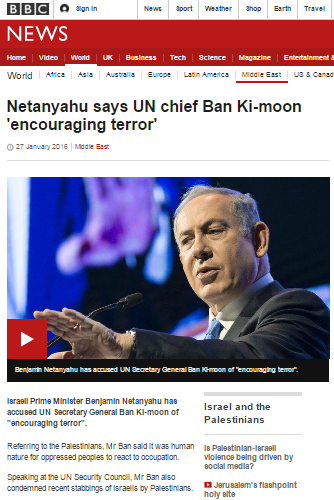
“Israel has approved the construction of 153 new settler homes in the West Bank, the NGO Peace Now said on Monday.
The move marked the end of an informal construction freeze in the West Bank that lasted for 18 months, Peace Now added.”
That written article materially misleads readers with regard to the reasons for the collapse of negotiations between Israel and the PLO in 2013/4.
“US-backed peace talks between Israel and the Palestinians collapsed in 2014.
The Palestinians complained that Israel was building settlements on land they claim for a future state.”
The link provided leads to a problematic BBC report from January 2014 which, like many of the BBC’s reports on Israeli construction, also promoted political messaging from ‘Peace Now’.
As is well known, the 2013/4 negotiations ultimately failed because the Palestinian Authority chose to form a ‘unity government’ with the terrorist organization Hamas. Even before those negotiations officially ended, the BBC’s portrayal of their collapse was serially inaccurate and fundamentally driven by a specific political narrative. Despite the fact that the agreed conditions for the resumption of negotiations in late July 2013 did not include a freeze on construction, the BBC’s efforts at the time to persuade audiences that negotiations were gravely endangered by Israeli construction plans were intense and even obsessive – but far from accurate or impartial.
BBC audiences have been serially misinformed about the topic of Israeli construction in Jerusalem and Judea & Samaria for years. As has been noted here in the past:
“The prime cause of the inaccurate impression received by audiences on this issue is the fact that the BBC refrains from reporting on actual building and instead focuses its (and its audiences’) attentions on requests for building tenders, even though it is a known fact that a considerable proportion of those tenders do not result in one breeze-block being laid or foundations being dug either because no bids are offered by contractors or bids which are made are too low.
Unsuccessful tenders are sometimes reissued, which often means that the foreign media – including the BBC – report the same tenders more than once. Such was the case, for example, in early April of this year when reissued tenders for 708 housing units in Gilo were reported by the BBC News website no fewer than three times in nine days.
Neither does the BBC overly trouble itself when it comes to reporting where exactly building tenders are located and whether or not they are in areas which, under any realistic scenario, will remain under Israeli control in the event of a peace agreement. Hence audiences remain oblivious of whether or not the plans cited by the BBC have any actual bearing or significance.”
That means that BBC audiences – including the viewers of Nick Bryant’s report – are ill equipped to put statements such as those from Ban Ki Moon amplified in these reports into their appropriate context and to engage in critical thinking on this issue. With Bryant having failed to inform them that construction has been frozen for many months, they will not be asking themselves, for example, why – if Ban’s remarks hold water – that did not prevent the outbreak of the current wave of terrorism against Israelis.
But of course the BBC has amply displayed over time that it has absolutely no intention of providing its audiences with impartial reporting, context, relevant background or alternative views concerning the topic of Israeli construction in locations in which – according to its adopted narrative – Jews should not reside. Instead, it continues to blinker them by limiting the information provided to that which bolsters one politically motivated narrative alone.
Related Articles:
BBC promotes ‘Peace Now’ campaign material yet again
BBC cites ‘large increase’ in Israeli building but fails to provide context
The BBC’s inaccurate and misleading representation of Israeli building – part one
The BBC’s inaccurate and misleading representation of Israeli building – part two

